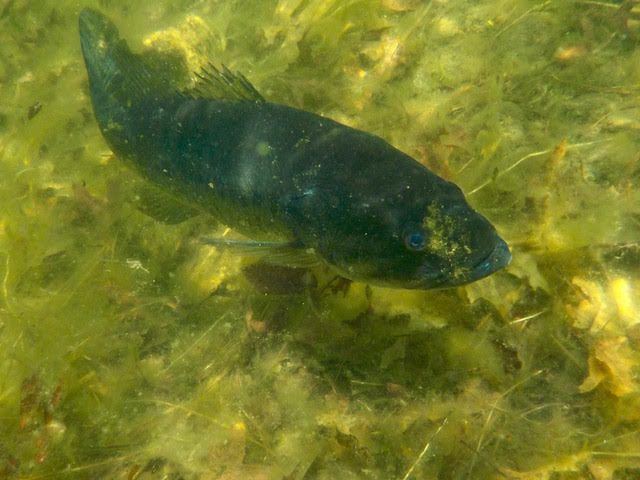By Susan Baur
(See more stories by Susan here.)
At the beginning of May, I took an unusually early swim using a new 5 mm wet suit with a hood. The pond stretched out before me like a piece of wide wale corduroy with line after parallel line of little waves running before a northwest wind.
I knew that on the pond floor bars of sunlight would travel so evenly across the bottom that I could steer by them. Pulling on the thick, foamy wet suit and managing to zip it up, I fell forward into the water. Up came the familiar pond floor, all glistening tans and browns. Up came the familiar wave of curiosity. But nothing else.
Except for a tiny area around my mouth, I didn’t feel the water. For a moment I lay on the pond like a block of wood waiting to feel cold, but even as I felt water seeping into my gloves and booties, I realized, with a happy shock that at this minimal rate of cooling, I could stay in the water as long as I wanted. A new season opened, and I was not surprised to hear myself singing.
Moving like a little kid in a snow suit, I paddled clumsily toward a large pitch pine that had fallen into the pond over the winter. As I approached, I could see its needles were still green, its cones closed tight, and its branches covered by sagging yellow cobwebs of algae. Among these shrouded branches danced hundreds of baby perch each the size of my finger. Waves of them flickered out from the pine tree then darted back into the dark center of the tree. They swam in tight groups and they swam singly. No matter where I looked, every nook and cranny of the fallen pine quivered with flashing stripes of yellow and gray. As I hung motionless in three feet of water watching the happy commotion, I was joined by two and then four large bass, their downturned mouths giving them an air of disapproval. They swam within two or three feet of me until the five of us hung in a straight line staring at the exuberant perch.
“You’re wasting energy,” said the bass.
“Go perch,” I whispered.
Continuing to watch, I noticed that roughly half the little fish had a dot of something the size of a peppercorn on its back. It looked like mucus or gelatin. I tried to picture a perch egg. Could this blob be a remnant? Not likely. The fish had hatched a month ago, and the mucus-like blob wasn’t the same size or in the same location on each perch.
Excited to have a reason to return, I planned another swim. Over the years, I had developed a real fondness for perch. Jaunty, competitive, and of all the pond fish I knew, the most joyful. They embodied the power of the natural world.
Returning three days later, I barely registered the two dead fish washed up on the beach until I pushed off and found myself swimming over a graveyard of dead perch. Belly up on the bottom, I counted several dozen of the slim silver fish as I swam toward the pine. Although I passed over two or three dead fish that had been bitten in half, the vast majority lay undisturbed, some seemingly encased in the mucus I’d seen on their backs. What had happened?
The fallen tree was still swarming with baby perch, but my relief didn’t last. The gelatinous blobs on their backs were now two and three times larger. In and out of the pine branches flitted the fingerlings, snapping up bits of food I couldn’t see, flashing in the sunlight, and all seeming normal. But I now knew that the ones with blobs were going to die, and I had a hard time finding any without something growing out of its back. Turning my attention back to the pond floor as I circled the pine, it didn’t take long to find perch lying on their sides barely moving and others, dead. A few were totally encased in the opaque goop. A fungus? I swam on wondering if the big bass I’d seen or the snapper I was looking for now would get sick from eating the dying perch or would they starve later in the summer without an entire generation of perch to eat?
Finally seeing the big snapper ahead of me, I put on the brakes.
“Bad week for perch,” I told him, and couldn’t help thinking back to the thirty-six feet of healthy young fish I’d swum through before in this same pond. How could so many of this year’s fish be dying? The snapper’s head was hidden in the mud and his broad brown and green shell looked like a moldy checker board lying on the bottom.
“Have you seen this before?” I insisted, but before he could answer or even move, I swam away.
Several emails to fish and wildlife departments produced tentative answers. Spring spawning time is stressful not only for adult fish but for all ages of every creature as everything in the pond bursts into action at the same time. Clouds of milt, clouds of plankton, webs of algae– it was a wonder there was oxygen enough for all. Under such stress I was told that bacterial infections sometimes ripped through populations of fish followed by secondary fungal infections.
On my final swim that month I saw only one dead perch on the bottom and perhaps six healthy perch in the fallen tree. This year’s population had crashed. On my way back to the beach I thought of how fragile pond ecosystems are and how hard they struggle in the face of global warming and added nutrients from lawns and septic systems. Did entire ponds crash, I wondered?
“We lose objects suddenly but experience the loss gradually,” Eric Weiner observed in his book The Socrates Express, noting that we are all reluctant to admit to ourselves that what we love or need is not just missing but gone.
Hauling out on the beach, water streaming from my new wet suit, I wondered if we were kidding ourselves in thinking ponds were merely impaired or struggling when maybe some of them were really gone.
For more ideas about how to save your pond, go to State of the Waters Action Plan.
And remember, always check with your local conservation office before undertaking any projects around a pond so that you don’t run afoul of local and state wetlands protection regulations.
Pond Stories are a collection of writings and other media from Cape Codders and visitors who love the almost 1,000 local ponds that dot the Cape. We hope this collection of stories awakens your inner environmentalist to think deeper about our human impacts to these unique bodies of water.
Send us your favorite pond photo, story, poem, video, artwork–we want to share with everyone why the Cape’s ponds and lakes are so special! Email your pond connection to [email protected]


